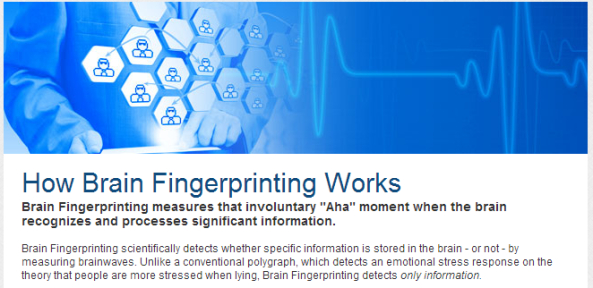A polygraph is a very old technology, invented in 1921. Rarely something as old is still being widely used. In 2003, a polygraph (lie detector) was mentioned by Encyclopedia Britannica’s list of greatest inventions as having had profound effects on human life for better or worse. However, 2 years earlier, a great number of scientists seriously considered it to be a pseudoscience. It’s far from perfect. Loosen the criteria, and you’d be netting way too many innocents. Tighten up your criteria, and you miss most of them. A polygraph examination is also referred to as a psychophysiological detection of deception (PDD) examination.
 It relies mostly on physiological reaction of your body. Counter-measure techniques are simple: relax and deceive! Counting backwards from 1,000 by sevens might help. Hardened criminals rarely fail. They don’t sweat easily in air-conditioned rooms, being politely asked a few stupid questions. People with subtle emotional composition fail more often than not. Too bad for sensitive folks among us. It was reported that some 25% of applicants for government jobs were rejected solely because they couldn’t control their bodily functions (trembled and sweated, pulse racing) and failed PPD.
It relies mostly on physiological reaction of your body. Counter-measure techniques are simple: relax and deceive! Counting backwards from 1,000 by sevens might help. Hardened criminals rarely fail. They don’t sweat easily in air-conditioned rooms, being politely asked a few stupid questions. People with subtle emotional composition fail more often than not. Too bad for sensitive folks among us. It was reported that some 25% of applicants for government jobs were rejected solely because they couldn’t control their bodily functions (trembled and sweated, pulse racing) and failed PPD.
Is there anything newer and more in line with 21st century than polygraph lie detector? Yes, there is.
Around 2006, cognitive neuroscience and technological advances of recent years suggest that it is possible to differentiate between the “innocent” brain activity and the “guilty” one. In “neuroscientific” parlance: Neural evidence of incriminating memories has been indexed by Event-Related Potentials (ERPs) Other words, your brain is your giveaway, and “read my mind” is no longer a metaphor or the stuff of the paranormal or pseudo-scientific.
While scientists continued their research and delved into the intricacies of the subject, the entrepreneurial minds jumped right in. Nowadays, several emerging companies aggressively advertise commercial implementations of brain activity guilt detection, most prominently — No Lie MRI and Brain Fingerprinting Laboratories. Both companies rely on the same research in neuroscience but use different technologies to implement it. Brain science, technology and venture capital together at last.
This is how No Lie MRI advertises their services:
The fMRI apparatus is not advisable for claustrophobic individuals, people with metal objects in their heads, brain damaged and those who cannot remain still for the duration of the test. It looks like this:
Brain Fingerprinting Laboratories insist that their methods are better, cheaper and more reliable:
In layman terms, the above advertised tests assume that the memory of the crime (misdeed, episode of bad behavior etc) is stores in your mind. Smartly devised “reminders” of it uncontrollably elicit memory-related neural activity. The presence or absence of such brain activity is interpreted. One enterprise uses fMRI, while another measures frequencies of brain waves. Diagnosis depends on whether or not incriminating information is stored in your brain. Both No Lie MRI and Brain Fingerprinting claim that their methods are foolproof and, unlike polygraph, cannot be fooled.
Not so, the more recent research shows. The article is titled Intentional retrieval suppression can conceal guilty knowledge in ERP memory detection tests (ERP). In a nutshell, it shows that regardless of the technology used, both “breakthrough” commercial truth verification methods are no better in telling lies we tell from truth we want to conceal.
…humans can control whether they remember a previous experience by intentionally suppressing retrieval. We examined whether people could use retrieval suppression to conceal neural evidence of incriminating memories as indexed by Event-Related Potentials (ERPs). When people were motivated to suppress crime retrieval, their memory-related ERP effects were significantly decreased, allowing guilty individuals to evade detection. Our findings indicate that brain measures of guilty knowledge may be under criminals’ intentional control and place limits on their use in legal settings.
…An innocent verdict in a guilty knowledge test could arise because a suspect is truly innocent, because they have forgotten the particular details of the crime that are being tested, or because they are highly motivated to disguise their knowledge and are intentionally suppressing crime memories.
In a way, I’m happy about this development. I’m happy that humans are capable to control their brain activity. Hardened psychotic murderer would easily deceive both of the above contraptions, I’m sure, just as they routinely deceive the old polygraph. In my mind (no pun intended) there are so few things that can be kept private these days, and so many ways to turn yourself inside out… There must be something that can be safely stored inside the gray matter inside our skulls… No, I don’t mean metal objects implanted in some of our heads. Do I sound like a retrograde?
Speaking of object implanted in human heads… really tiny ones… microchips of sorts… scary thought…


